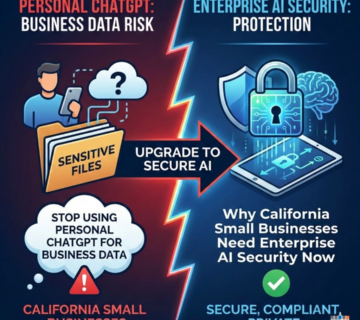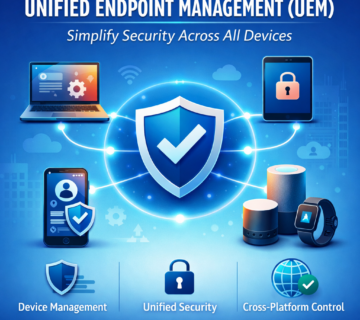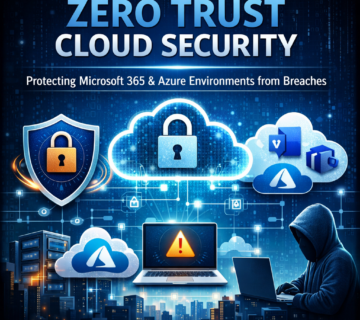Cybercriminals Weaponize PuTTY Ads to Deploy OysterLoader Malware in Sophisticated Attack Campaign
🎙️ Dive Deeper with Our Podcast!
Rhysida Weaponizes Ads to Deploy OysterLoader Malware
👉 Listen to the Episode: https://technijian.com/podcast/rhysida-weaponizes-ads-to-deploy-oysterloader-malware/
Executive Summary
A highly sophisticated malvertising operation orchestrated by the Rhysida ransomware collective is compromising organizations worldwide through poisoned search advertisements. The campaign exploits trusted software brands like PuTTY, Microsoft Teams, and Zoom to distribute OysterLoader malware, establishing unauthorized access to enterprise networks and individual devices.
The Threat Landscape
Security researchers have identified an alarming trend in cybercrime tactics: the weaponization of legitimate advertising platforms to distribute malicious software. The Rhysida group, which emerged as a rebrand of the Vice Society ransomware operation in 2023, has developed an intricate attack methodology that capitalizes on user trust and search engine advertising systems.
Attack Methodology: How the Campaign Works
Initial Compromise Vector
The attack begins when unsuspecting users search for popular software applications through Bing’s search engine. Cybercriminals purchase premium advertising placements that position their malicious links at the top of search results—often above legitimate sources.
What makes this particularly dangerous for Windows 11 users is that these compromised advertisements can appear directly within the operating system’s Start Menu search function, creating an illusion of legitimacy and safety.
Deceptive Landing Pages
When victims click these advertisements, they’re redirected to meticulously crafted counterfeit websites that mirror authentic download pages. These fraudulent sites feature:
- Professional design elements matching official branding
- Convincing URLs that resemble legitimate domains
- Download buttons that deliver malware instead of genuine software
- SSL certificates that display the padlock icon in browsers
OysterLoader: The Gateway Malware
The payload delivered through these channels is OysterLoader, a specialized malware strain designed specifically for initial access operations. Unlike ransomware that immediately encrypts files, OysterLoader operates with stealth and patience:
Primary Functions:
- Establishes persistent backdoor access to compromised systems
- Provides attackers with reconnaissance capabilities
- Enables lateral movement across network infrastructure
- Facilitates deployment of additional malicious payloads
This two-phase approach allows threat actors to thoroughly infiltrate target environments before launching destructive attacks or data exfiltration operations.
Campaign Evolution and Scale
Timeline Analysis
The current offensive launched in June 2025, representing a significant expansion from the group’s preliminary operations conducted between May and September 2024. The scope of this escalation is quantifiable through several metrics:
2024 Campaign:
- Duration: 5 months (May-September)
- Code-signing certificates utilized: 7
- Limited targeting scope
2025 Campaign:
- Active since: June 2025
- Code-signing certificates deployed: Over 40
- Expanded infrastructure and targeting
This six-fold increase in certificate usage demonstrates substantial financial investment and operational commitment to this attack vector.
Evasion Techniques
Advanced Packing Technology
Rhysida employs sophisticated malware packers that serve multiple purposes:
- Compression: Reduces file size to facilitate faster downloads
- Encryption: Conceals malicious code from static analysis tools
- Obfuscation: Disguises the malware’s true functionality
Initial detection rates for packed samples remain critically low—often triggering alerts from fewer than five antivirus engines during the first hours of distribution. Detection capabilities typically improve only after several days, creating a dangerous window of vulnerability.
Certificate Abuse Strategy
The group’s most effective evasion technique involves abusing code-signing certificates, which provide malicious executables with an aura of trustworthiness. Operating systems and security software traditionally grant signed applications elevated trust levels, assuming they’ve undergone verification processes.
Certificate Sourcing Methods:
- Stolen certificates from legitimate organizations
- Fraudulently obtained certificates through compromised accounts
- Exploitation of Microsoft’s Trusted Signing service
Microsoft Trusted Signing Exploitation
Particularly concerning is the group’s discovery of methods to abuse Microsoft’s Trusted Signing service—a system designed to provide temporary 72-hour certificates for legitimate software distribution. The Rhysida gang has weaponized this service to sign malicious files at industrial scale.
Microsoft’s response included revoking over 200 certificates associated with the threat actors. However, the group’s operations continue uninterrupted, suggesting they’ve developed sustainable methods for obtaining new certificates.
Defensive Opportunities
While the campaign presents serious threats, the attackers’ reliance on code-signing certificates creates a tracking opportunity for defenders. When certificate authorities revoke compromised certificates, the emergence of new valid certificates signals renewed campaign activity.
Security firm Expel actively reports discovered certificates to issuing authorities, enabling operating systems and security solutions to identify and block associated malware more effectively through certificate revocation lists (CRLs) and Online Certificate Status Protocol (OCSP) checks.
Industry Impact
This campaign underscores several critical cybersecurity challenges:
- Platform Trust Exploitation: Legitimate advertising platforms become attack vectors
- Supply Chain Implications: Users downloading what they believe is legitimate software receive malware
- Detection Gaps: Low initial detection rates create exposure windows
- Certificate System Vulnerabilities: Trusted signing mechanisms can be weaponized
Frequently Asked Questions (FAQ)
What is OysterLoader malware?
OysterLoader is a specialized malware strain classified as an “initial access tool” or “loader.” Rather than causing immediate damage, it establishes a hidden backdoor on infected systems, allowing attackers to maintain long-term access and deploy additional malicious software. It’s designed specifically to give cybercriminals a persistent foothold in target networks.
How do I know if I’ve downloaded malicious software from these ads?
Warning signs include:
- Software downloaded from unfamiliar domains (always verify URLs match official websites)
- Unexpected certificate warnings during installation
- Antivirus alerts, even if only briefly displayed
- Unusual system behavior after installation
- Network connections to unknown IP addresses
- Unexpected processes running in Task Manager
If you suspect infection, immediately disconnect from the network and contact your IT security team.
Which software applications are being impersonated?
The current campaign primarily targets users searching for:
- PuTTY (SSH client)
- Microsoft Teams (collaboration platform)
- Zoom (video conferencing software)
However, attackers may expand to other popular applications. The key is that they target widely-used, frequently downloaded software to maximize potential victims.
Why do these malicious ads appear at the top of search results?
Cybercriminals purchase legitimate advertising placements through platforms like Bing Ads. Because paid advertisements are positioned above organic search results, users naturally click them first, assuming they lead to official sources. The attackers pay real money to advertising platforms to display their malicious links prominently.
Are Mac and Linux users also at risk?
While this specific campaign primarily targets Windows users (particularly Windows 11 due to Start Menu integration), the malvertising technique itself is platform-agnostic. Mac and Linux users should remain vigilant as attackers may develop platform-specific variants. The broader lesson about verifying software sources applies to all operating systems.
How are attackers obtaining code-signing certificates?
The Rhysida group employs multiple methods:
- Theft: Stealing certificates from compromised organizations
- Fraudulent Applications: Using false information to obtain certificates from certificate authorities
- Service Abuse: Exploiting legitimate signing services like Microsoft’s Trusted Signing platform
- Purchase: Acquiring certificates from dark web marketplaces
What should organizations do to protect themselves?
Immediate Actions:
- Educate employees about the risks of clicking sponsored search results
- Implement network-level ad blocking or filtering
- Require software downloads only from official repositories or verified sources
- Deploy endpoint detection and response (EDR) solutions
- Maintain updated antivirus definitions
- Monitor code-signing certificate revocation lists
- Conduct regular security awareness training
Can antivirus software detect this malware?
Initially, detection rates are extremely low due to sophisticated packing techniques—often only 5 or fewer antivirus engines detect new samples. Detection improves over days as security vendors analyze samples and update signatures. This highlights the importance of:
- Behavioral detection capabilities (not just signature-based)
- Endpoint Detection and Response (EDR) solutions
- Network monitoring for suspicious communications
- Prevention rather than detection alone
Why is this campaign considered particularly dangerous?
Several factors elevate the threat level:
- Scale: Over 40 code-signing certificates in 2025 indicate significant resources
- Persistence: Operations continue despite Microsoft revoking 200+ certificates
- Sophistication: Multi-layered evasion techniques including packing and certificate abuse
- Strategic Approach: Initial access focus enables larger, more damaging attacks later
- Trust Exploitation: Abuses both advertising platforms and code-signing trust models
- Windows 11 Integration: Malicious ads appear in the OS itself, not just web browsers
Is this the same group as Vice Society?
Yes, Rhysida is the rebranded identity of the Vice Society ransomware operation. The group changed its name in 2023 but continues similar attack patterns and tactics. This type of rebranding is common among cybercriminal organizations attempting to evade law enforcement attention or distance themselves from negative publicity.
What is the connection between OysterLoader and ransomware?
OysterLoader itself is not ransomware—it’s an initial access tool. However, it’s operated by the Rhysida ransomware gang as the first stage of their attack chain. The typical progression is:
- Stage 1: OysterLoader infection via malvertising
- Stage 2: Reconnaissance and lateral movement across the network
- Stage 3: Credential harvesting and privilege escalation
- Stage 4: Ransomware deployment or data exfiltration
This separation allows attackers to study the environment and maximize damage before revealing their presence.
How can I verify I’m downloading software from legitimate sources?
Best Practices:
- Avoid sponsored ads: Scroll past advertisements to organic search results
- Type URLs directly: Navigate directly to official websites (e.g., putty.org)
- Verify URLs carefully: Check for slight misspellings or unusual domain extensions
- Use official app stores: Download from Microsoft Store, Mac App Store, or Linux repositories when possible
- Check developer signatures: Verify the publisher name matches the official developer
- Cross-reference: Visit the official project website separately to confirm download links
How Technijian Can Help Protect Your Organization
At Technijian, we understand that sophisticated threats like the OysterLoader malvertising campaign require comprehensive, multi-layered defense strategies. Our cybersecurity experts specialize in protecting organizations from advanced persistent threats and initial access attacks.
Our Protective Services Include:
🛡️ Advanced Threat Detection & Response
- 24/7 security monitoring with AI-powered threat intelligence
- Endpoint Detection and Response (EDR) deployment and management
- Real-time behavioral analysis to identify packed malware before execution
- Custom detection rules for emerging threats like OysterLoader
🔒 Network Security Hardening
- Enterprise-grade ad and malvertising blocking solutions
- DNS filtering to prevent access to malicious domains
- Network segmentation to limit lateral movement
- Secure web gateway implementation
👥 Security Awareness Training
- Comprehensive employee education programs on malvertising threats
- Simulated phishing and malicious ad campaigns
- Best practices for safe software downloading
- Incident reporting procedures and protocols
🔍 Certificate Management & Monitoring
- Code-signing certificate validation and monitoring
- Certificate Revocation List (CRL) enforcement
- Automated blocking of revoked certificates
- Software whitelisting and application control
⚡ Incident Response Services
- Rapid response to suspected OysterLoader infections
- Forensic analysis and threat hunting
- Malware removal and system remediation
- Post-incident security improvements
🎯 Vulnerability Assessment
- Regular security audits identifying attack surface exposures
- Penetration testing simulating malvertising attack vectors
- Configuration reviews for Windows 11 security settings
- Software inventory and patch management
Why Choose Technijian?
✅ Proven Expertise: Our team has successfully defended hundreds of organizations against sophisticated malware campaigns
✅ Proactive Approach: We identify and neutralize threats before they impact your operations
✅ Rapid Response: 24/7 availability with guaranteed response times for critical incidents
✅ Comprehensive Protection: End-to-end security covering technical controls, user awareness, and incident response
✅ Tailored Solutions: Security strategies customized to your industry, size, and risk profile
Take Action Today
Don’t wait for an infection to compromise your network. The OysterLoader campaign demonstrates that even trusted search results can deliver devastating malware. Contact Technijian today for a complimentary security assessment and learn how we can protect your organization from malvertising threats and advanced persistent threats.
📞 Contact Us: Schedule a consultation with our cybersecurity specialists to discuss your organization’s specific vulnerabilities and develop a comprehensive defense strategy against malvertising campaigns and ransomware threats.
Stay informed. Stay protected. Stay ahead of cyber threats with Technijian.
About Technijian
Technijian is a premier Managed IT Services provider in Irvine, specializing in delivering secure, scalable, and innovative AI and technology solutions across Orange County and Southern California. Founded in 2000 by Ravi Jain, what started as a one-man IT shop has evolved into a trusted technology partner with teams of engineers, AI specialists, and cybersecurity professionals both in the U.S. and internationally.
Headquartered in Irvine, we provide comprehensive cybersecurity solutions, IT support, AI implementation services, and cloud services throughout Orange County—from Aliso Viejo, Anaheim, Costa Mesa, and Fountain Valley to Newport Beach, Santa Ana, Tustin, and beyond. Our extensive experience with enterprise security deployments, combined with our deep understanding of local business needs, makes us the ideal partner for organizations seeking to implement security solutions that provide real protection.
We work closely with clients across diverse industries including healthcare, finance, law, retail, and professional services to design security strategies that reduce risk, enhance productivity, and maintain the highest protection standards. Our Irvine-based office remains our primary hub, delivering the personalized service and responsive support that businesses across Orange County have relied on for over two decades.
With expertise spanning cybersecurity, managed IT services, AI implementation, consulting, and cloud solutions, Technijian has become the go-to partner for small to medium businesses seeking reliable technology infrastructure and comprehensive security capabilities. Whether you need Cisco Umbrella deployment in Irvine, DNS security implementation in Santa Ana, or phishing prevention consulting in Anaheim, we deliver technology solutions that align with your business goals and security requirements.
Partner with Technijian and experience the difference of a local IT company that combines global security expertise with community-driven service. Our mission is to help businesses across Irvine, Orange County, and Southern California harness the power of advanced cybersecurity to stay protected, efficient, and competitive in today’s threat-filled digital world.





